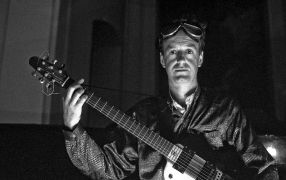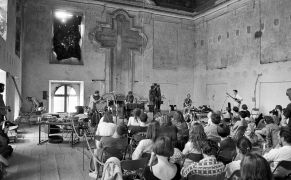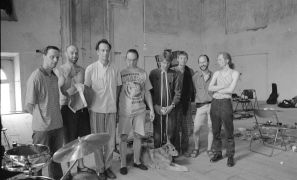Entarctic Shelf Festival: 23 June – 3 July, 1995
“Concert for Guitar and Midi Guitar consisted of a guided improvisation, using STEIM software ‘the lickmachine’ which modified my electric/midi guitar playing into a desirable form, through a series of ‘klangfarben’ presets. The noisemachine formed an analog counterpoint.”
Wiel Conen, August 2017
Besides his solo performance, Wiel took part in a jam session with several musicians and played in the duo with Allan Paivio (violin) in the St. Bernard Chapel (see video, 7:00).
Dutch composer Wiel Conen (1953) started his career in the United States by studying Music Theory in Los Angeles. He then studied Composition at the Juilliard School in New York. Following his return to the Netherlands, he continued his training under composer Misha Mengelberg, and at the Sweelinck Conservatory in Amsterdam. He started to experiment: with a simple computer and The electronic composition are now a very important part of his oeuvre. Conen says: “It was fascinating that sounds could change their shape through digital processes.” Wiel Conen started to write in 1978 following a period during which he performed as a guitarist focussing mainly on improvised music: pop and free jazz. “At that time, what I call ’moment compositions’ were created: improvisations which were recorded on tape on the spot. Working from those improvisations, I started to apply structure, and that led to actual compositions: particularly when I gained access to a multi-track tape recorder with which you can superimpose several soundtracks with different messages.” The emphasis increasingly shifted to the composition. His guitar-playing slipped into the background.
The Lick Machine © (or MIDI Performance Machine) allows the artist to use MIDI controllers to conduct an electronic orchestra through completely controllable sequences. It is one of the earliest general-use pieces of software to come out of STEIM. The program uses so called performance setups, in which you trigger and ‘drive’ a group of pre recorded sequences, the so called Licks. With a single key from a Midi keyboard, a complex series of musical events can be triggered, i.e. a Lick.


